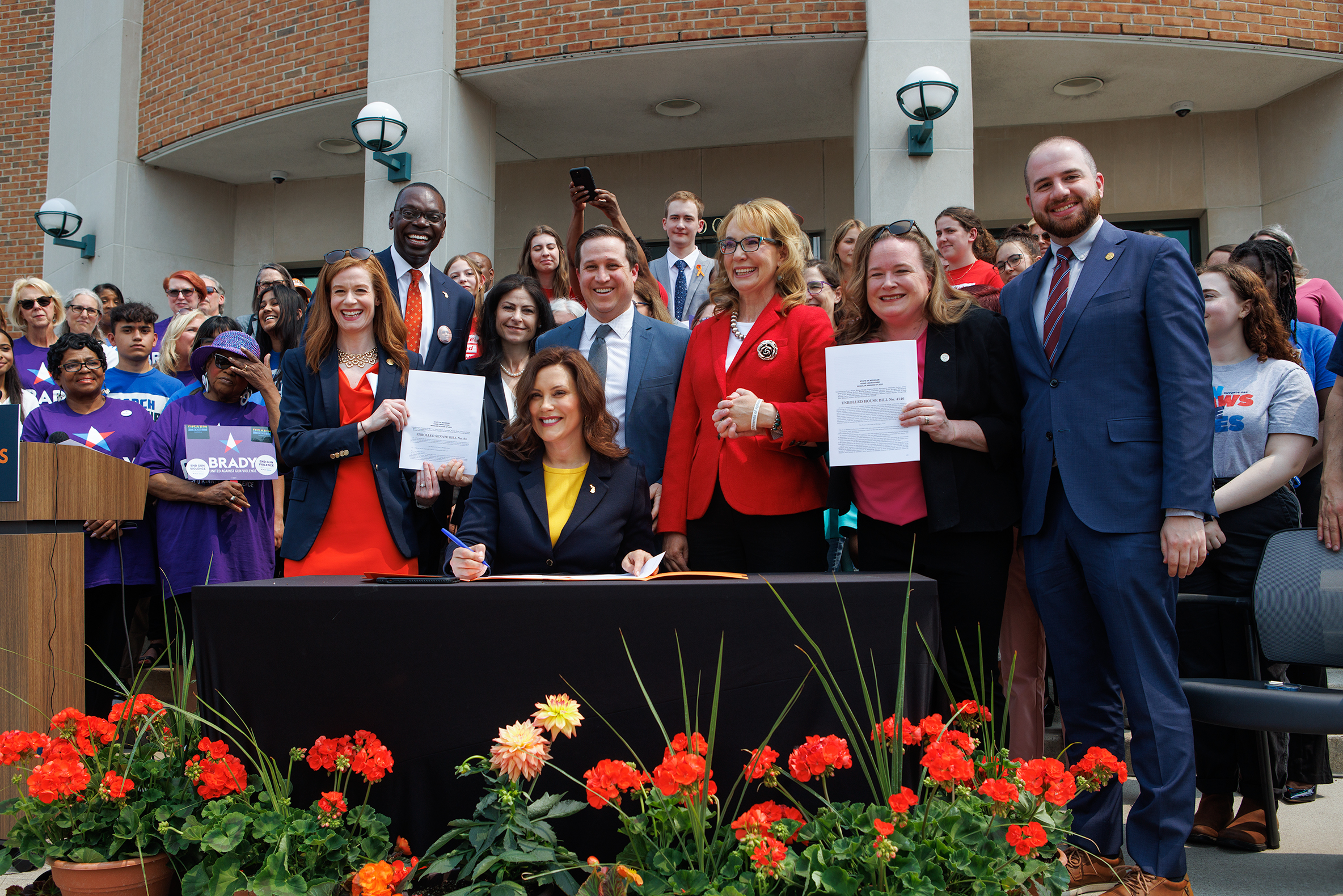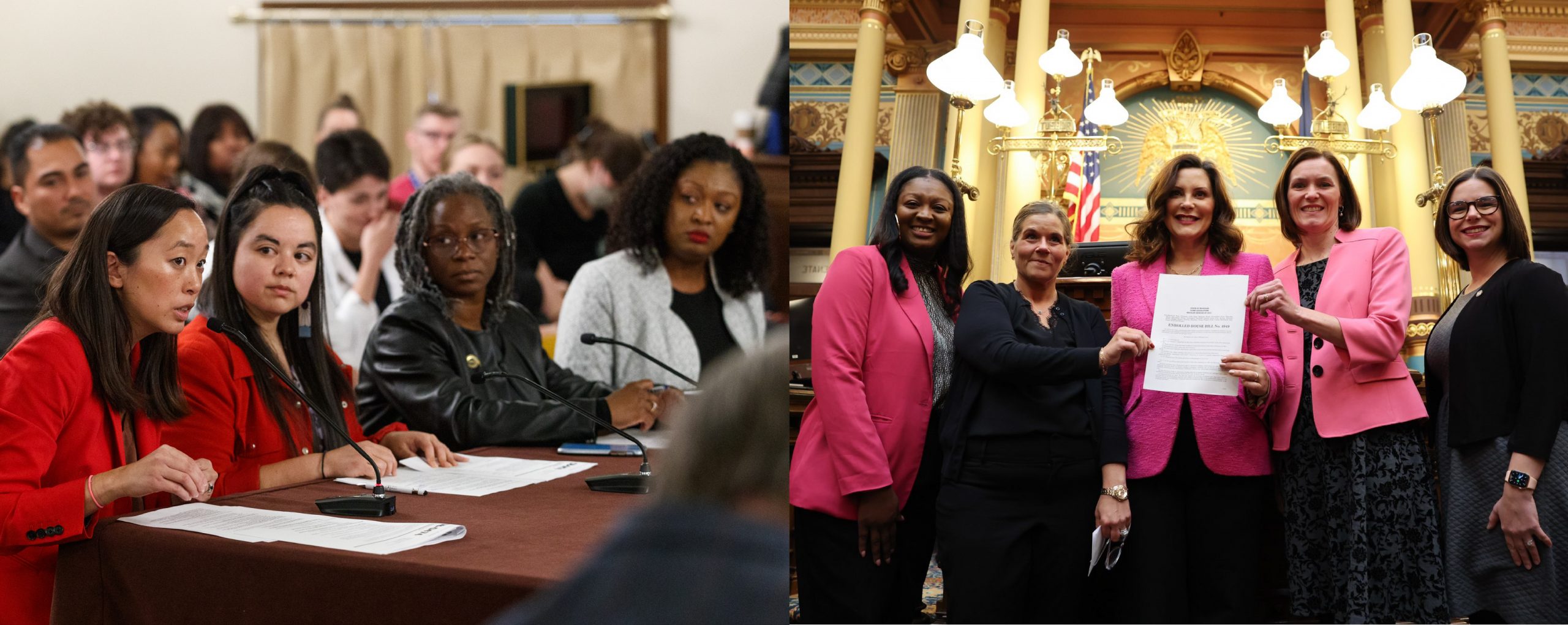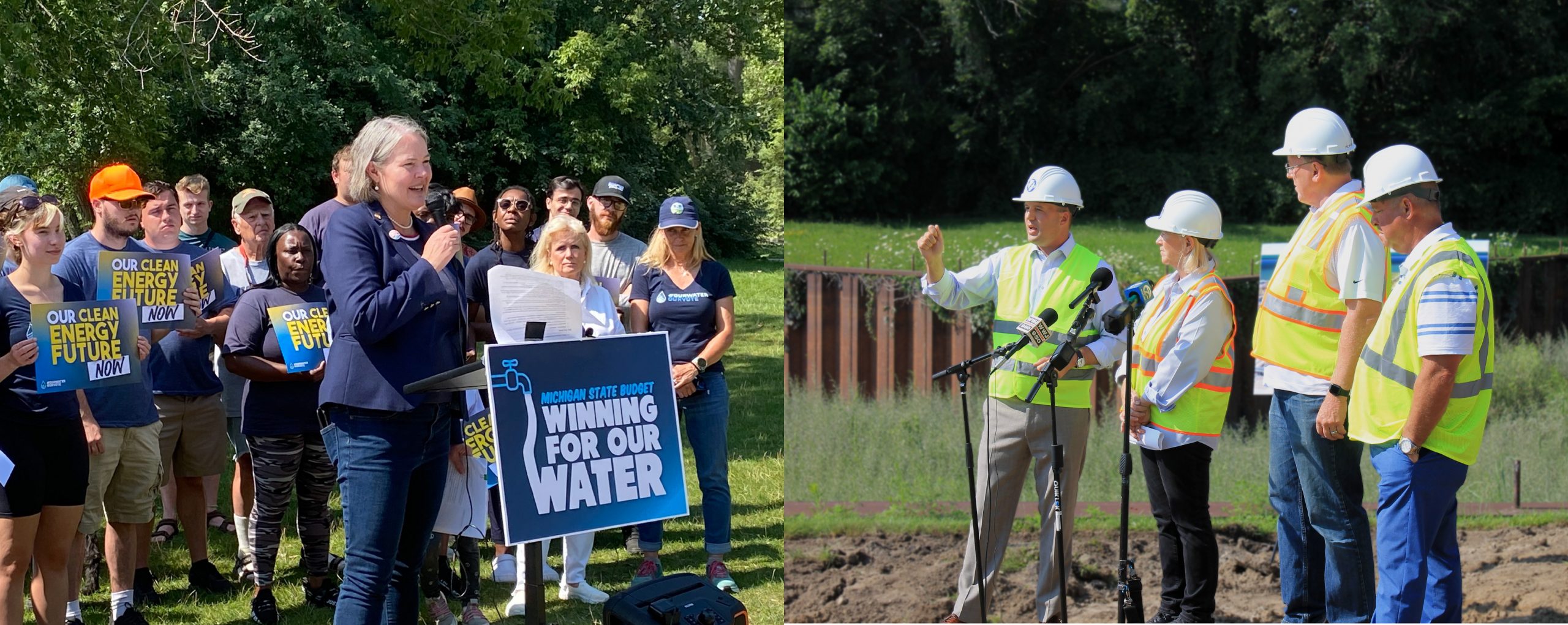Public health encompasses a multifaceted approach to the prevention of disease, promotion of wellness and enhancement of individuals’ quality of life. From behavioral healthcare and infectious disease prevention to water quality monitoring and environmental standards — public health initiatives touch Michiganders’ everyday lives, shaping the conditions in which we live, work, and play.
With the new opportunity to better address these needs, our Majority for the People has worked to pass comprehensive, evidence-based policies to expand access to healthcare and improve the health of Michigan residents. As we observe Michigan Public Health Week, Michigan Senate Democrats recognize the invaluable contributions of those who safeguard the health of our communities — including first responders, social workers, doctors, nurses, scientists, and researchers — and recommit to supporting their efforts as we work collectively to promote the well-being of our state.
During our first year-plus in office, Senate Democrats have wasted no time in enacting meaningful policies and securing investments to achieve a brighter, healthier Michigan for future generations. Learn more about the great strides Senate Democrats have made to expand access to healthcare, protect reproductive rights, keep our air and water clean, and more.
Expanding Access to Care
A critical component in bolstering Michiganders’ health is ensuring they have access to healthcare, including preventative screenings and treatments. A federal policy instrumental in expanding health insurance coverage was the federal Affordable Care Act, commonly known as the ACA, which was signed into law in 2010. Since its passage, the ACA has provided 40 million Americans with access to healthcare, expanded Medicaid to cover 21 million low-income adults under 65 and protected as many as 133 million individuals with pre-existing conditions from losing their health insurance.
Since it was signed into law, the Affordable Care Act has been a game changer for the health of Michiganders — helping expand access and improve quality of care. As we celebrate 14 years of the ACA, let's keep working on building a brighter, healthier future for Michigan. pic.twitter.com/Kvn53ZzZcY
— Senator Kevin Hertel (@Hertelforsenate) March 22, 2024
Despite the progress the ACA has made in expanding access to care, some have tried to repeal and weaken the law through various means, including an endless string of court challenges. To ensure Michiganders can continue to enjoy the protections the ACA provides for years to come, Michigan Senate Democrats, led by Senate Health Policy Committee Chair Sen. Kevin Hertel (D-St. Clair Shores), codified the most popular provisions of the Affordable Care Act in state law.
As a result, Michiganders cannot be denied coverage due to a pre-existing condition, can stay on their parents’ insurance until the age of 26, and more.
Sen. Darrin Camilleri (D-Trenton) speaks on the Senate floor in support of legislation that aims to lower the cost of medication through the establishment of a Prescription Drug Affordability Board.
Additionally, Senate Democrats took action to rein in the skyrocketing cost of prescription drugs. Senate Bills 483–485, sponsored by Sens. Darrin Camilleri (D-Trenton), Veronica Klinefelt (D-Eastpointe) and Kristen McDonald Rivet (D-Bay City), would establish an independent Prescription Drug Affordability Board (PDAB) in Michigan, which would have the power to set upper payment limits on the most expensive medications. This legislation would ultimately play a crucial role in identifying cost-saving opportunities and bring much needed accountability, oversight and transparency to the prescription drug industry.
Investing in Public Health
Michigan’s public health code requires the state to fund 50% of the basic public health services that all local health departments are legally mandated to provide. This includes infectious disease control, immunizations, hearing and vision services, food protection and more. However, for the past three decades, the state has failed to cover its mandated share, leaving municipalities across Michigan to pick up the slack.
Recognizing the importance local health services play in closing the health equity gap, the new Senate Democratic Majority made historic investments in public health and upheld its end of the bargain. The $76 million included in our 2024 State Budget will provide economic stability to local health departments and ensure they have the necessary resources to supply residents with essential health services — all while relieving the fiscal burden our communities have been shouldering for years.

In July 2023, Sen. Veronica Klinefelt and Sen. Kevin Hertel joined Lt. Gov. Garlin Gilchrist II, the Michigan Veterans Affairs Agency (MVAA), fellow legislators and veteran-serving organizations for a roundtable discussion on veteran and military suicide prevention.
In addition to providing a funding boost to local health departments, our 2024 “Budget for the People” also made transformational investments to reshape Michigan’s health landscape and increase access to care for residents across the state. A few highlights include:
- $280 million to address our mental health crisis through funding for community behavioral health services to expand access to care.
- $63 million increase in funding for Healthy Moms, Healthy Babies, an initiative providing postpartum Medicaid coverage to mothers in an effort to reduce postpartum deaths.
- $61.4 million to increase access to healthy food, fund mobile health units, and provide support to community health programs and healthy community zones.
- $16.4 million for Rx Kids, an initiative designed to uplift babies and young children out of poverty and provide them with a lifetime of better health, equity, education and opportunity.
- $1.2 million to fund suicide prevention and other well-being initiatives that support the 550,000 veterans who call Michigan home.
Combating Our Gun Violence Epidemic
Gun violence is a public health crisis that plagues communities across our state, leaving an irrevocable mark on mothers and fathers, sisters and brothers, friends and neighbors. Since 2012, we’ve seen the rate of gun deaths in Michigan increase by 25%, and firearms are now the leading cause of death for children and teens. In addition to the human toll this crisis creates, gun violence also comes with a steep price tag for our state — costing Michigan approximately $16.8 billion each year, of which $380.5 million is paid by taxpayers. For all of these reasons, there has never been a more important time for lawmakers to take action on commonsense policies that are proven to make our communities safer.

Sen. Mallory McMorrow (D-Royal Oak) and Sen. Jeremy Moss (D-Southfield) join gun violence survivors and advocates for the signing of commonsense gun safety legislation that will give Michiganders the tools needed to prevent firearm suicide and keep our communities safe.
After assuming the Majority, Senate Democrats delivered a slate of gun violence prevention legislation that Michigan residents have waited years for. The legislation passed closes dangerous loopholes to strengthen background checks, requires the secure storage of firearms, disarms individuals convicted of domestic violence and allows for the temporary removal of firearms from people who pose a significant risk to themselves or others.
Senate Democrats also included critical investments in the 2024 budget to curb the state’s gun violence crisis, including $800,000 to create the Office of Community Violence Services and $6 million for the office to provide grants to community-based violence intervention programs that are working to reduce firearm-related injuries and fatalities.
Protecting Michiganders’ Reproductive Freedom
After the U.S. Supreme Court overturned Roe v. Wade, dismantling five decades of legal precedent and threatening access to safe and legal abortions across the country — Michiganders stepped up, spoke up and headed to the ballot box to protect the right to choose.
Hearing voters’ roaring calls for reproductive freedom, Michigan Senate Democrats took swift action to repeal the state’s archaic 1931 abortion ban that included no exceptions for rape or incest. Our work did not stop there, however. To ensure our laws accurately reflect our state’s values, Senate Democrats took further action, passing the Reproductive Health Act, which repealed medically unnecessary regulations and dismantled barriers many Michiganders faced when attempting to exercise their reproductive freedom.

On the left, Sens. Stephanie Chang (D-Detroit), Mary Cavanagh, Erika Geiss (D-Taylor), and Sarah Anthony (D-Lansing) provide testimony on their legislative package to dismantle barriers to exercising reproductive freedoms in Michigan. On the right, Senate Majority Leader Winnie Brinks (D-Grand Rapids) and Sen. Anthony join Gov. Gretchen Whitmer in the Senate Chamber as the final piece of the Reproductive Health Act is signed into law.
Believing that politicians should not get to determine if, when or how Michiganders choose to have a child, the Democratic Legislature also passed the Family Protection Act to eliminate barriers to parentage in fertility healthcare and allows Michiganders more ways to grow their families. This action came just weeks after the shocking Alabama court ruling which declared frozen embryos to have equal legal rights as children, jeopardizing fertility treatments such as IVF.
Tammy and Jordan Myers, constituents of Senate Majority Leader Winnie Brinks, share their personal story of how Michigan’s antiquated surrogacy laws affected their ability to grow their family. After meeting with the couple, Leader Brinks spent years working to address the issue and remove hurdles facing Michiganders looking to pursue parenthood.
Fighting for Clean Water and Clean Air
Another important aspect of public health is having access to clean air and water. To ensure Michiganders in every corner of the Great Lakes State — from Detroit and Saginaw to Grand Rapids and Marquette — can breathe clean air and drink clean water, the Senate Democratic Majority took bold action to enhance environmental protections, repair the state’s crumbling water infrastructure and more.
The most momentous legislation Senate Democrats passed to address the ensuing threats of climate change was our Clean Energy Future package, which sets long-awaited clean energy and renewable energy standards and increases energy efficiency targets. The plan also assists workers and communities during the state’s clean energy transition to support job growth and evolve the state’s economy.
Additionally, the Legislature, led by Sens. John Cherry (D-Flint) and Sylvia Santana (D-Detroit), acted in a bipartisan manner and passed Filter First legislation that will require Michigan schools and childcare centers to implement a drinking water management plan and install filtered faucets and bottle-filling stations, ensuring every student and educator can fill their water bottle or go to the water fountain knowing it is safe. The Legislature also passed Senate Bill 31, Sen. Cherry’s legislation to improve screening minors for lead poisoning. This initiative is crucial for protecting the health and well-being of minors and preventing the harmful effects of lead exposure.
Building off these legislative wins, Senate Democrats also included $600 million for statewide water infrastructure projects to replace lead service lines, rebuild sewers and more. Not only will these investments protect Michigan’s most precious natural resources, but they will also improve residents’ health and quality of life, ensuring the water they drink, cook and bathe with is free of dangerous contaminants.

On the left, Sen. Sue Shink (D-Northfield Twp.) and volunteers participate in a river cleanup event to bring attention to the importance of clean water and highlight wins secured in the 2024 state budget. On the right, Sen. Hertel speaks with local leaders at the Chapaton Retention Basin in St. Clair Shores, where a new project to address combined sewer overflows is underway.
By expanding access to healthcare, investing in public health initiatives, and leading
on clean energy, Senate Democrats have laid a foundation for a healthier and more equitable future and will continue working towards further progress — because our Majority for the People recognizes that the healthier Michiganders are as individuals, the stronger we are as a state.
Read more from the Michigan Senate Democrats at SenateDems.com/press.
